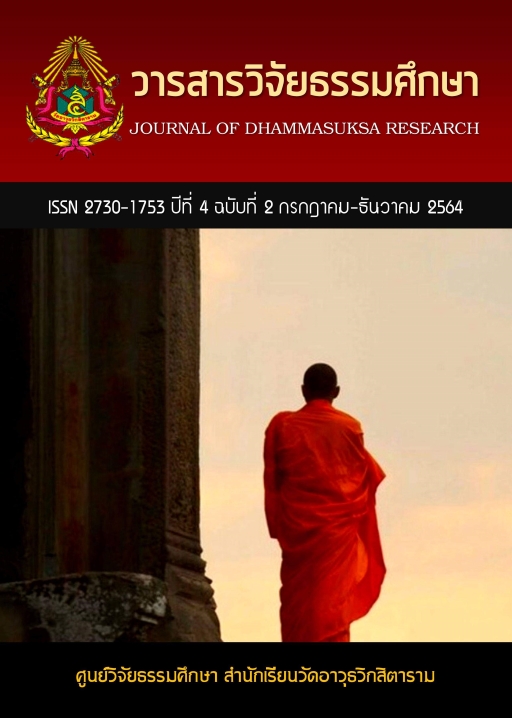Ethics Level and Conscious Expression to the Lack of Discipline in Society in Order to Find Means to Raise the of Ethics of Undergraduate Students in Bangkok
Keywords:
Ethics, Conscious, DisciplineAbstract
The research study on Ethics and Conscious Expression towards Lack of Discipline of Higher Education Students in Bangkok Area has 2 objectives: 1) to study the ethics of higher education students in Bangkok area 2) to study the expression of consciousness towards the lack of discipline in Thai society of higher education students in Bangkok area by reviewing and researching textbooks, documents, researches, including qualitative research, namely, interviews with experts. and group discussion. The results analyzed according to the objectives are as follows:
The results of the research revealed that ethics in Thai society are divided into 2 levels as follows: 1) The level of ethics according to religious teachings including the behavior conducted following the way of life of a religious follower for coexistence in society and the environment that brings benefits, peace and behavior that follows the course of the life of a religious devotee in order to achieve the ultimate goal of each person's religion 2) The level of ethics according to the relationship model of coexistence in society including the relationship between the individual and the society as a whole and environment, which is divided into (1) the individual level (2) the society and environmental level.
The cause of the lack of good conscience comes from factors such as people and environment. In other words, the lack of consciousness may be due to the lack of proper family discipline and enough morality from childhood. As a result, a person has a poor subconscious and behavior that may deviate from the correctness or appropriateness of society. However, on the other hand, if a person has been regularly trained in morality and goodness since childhood, he/she will absorb right and wrong, good and bad, and have a good conscience in his/her mind and a good subconscious. This will result in having a good conscience. These things affect the decision to do or not to do what is right or wrong, also should do or should not do.
References
กฤษฎาภรณ์ รุจิธำรงกุล. (2558). อิทธิพลด้านจิตสำนึกคุณธรรมความถูกต้องและความพึงพอใจของอาจารย์และนักศึกษาสายงานบริหารธุรกิจ. วารสารวิชาการ มหาวิทยาลัยกรุงเทพธนบุรี, 4(2),84-84.
ชายแดน เดชาฤทธิ์, อัญชลี ชยานุวัชร. (2561). การศึกษาประสบการณ์การทำผิดวินัยของนักเรียน ระดับชั้นมัธยมศึกษาตอนต้น จังหวัดปทุมธานี. วารสารนวัตกรรมการเรียนรู้, 4(1), 19-20.
ประไพรัตน์ ลำใจ. (2557). รูปแบบการพัฒนาคุณธรรมจริยธรรมนักเรียนระดับมัธยมศึกษา. วารสารมนุษยศาสตร์และสังคมศาสตร์ มหาวิทยาลัยพะเยา, 2(2), 64.
พระครูใบฎีกาสุบิน โสภโณ. (2560). แนวทางการขับเคลื่อนคุณธรรมจริยธรรมของเด็กและเยาวชนในจังหวัด เชียงราย. วารสารบัณฑิตศึกษา มหาวิทยาลัยราชภัฏเชียงราย, 10(2), 73.
เพ็ญแข ประจนปัจจนึก. (2551). การยกระดับคุณธรรมจริยธรรมของสังคมไทยเพื่อการปฏิรูปสังคม: แนวทางและการปฏิบัติ. รายงายการวิจัย.
เพชราวลัย ถิระวณัฐพงศ์, ปัญจ์ปพัชรภร บุญพร้อม. (2557). รับค่านิยมที่ผิดจะกลายเป็นบัณฑิตขาดจิตสำนึก.วารสารมหาวิทยาลัยนครพน, 4(2), 1.
แพง ชินพงศ์. วินัยที่เด็กไทยต้องมี. สืบค้นเมื่อวันที่ 22 กันยายน 2564, จาก shorturl.asia/wxBVX.
มาลี บุญมาก. (2556). ศึกษาวิเคราะห์พฤติกรรมเชิงจริยธรรมของนักเรียนประถมศึกษากรณีศึกษา อำเภอเก้าเลี้ยว จังหวัดนครสวรรค์. วิทยานิพนธ์ปริญญามหาบัณฑิต มหาวิทยาลัยมหาจุฬาลง กรณราชวิทยาลัย.

Downloads
Published
How to Cite
Issue
Section
Categories
License
Copyright (c) 2021 Journal of Dhammasuksa Research

This work is licensed under a Creative Commons Attribution-NonCommercial-NoDerivatives 4.0 International License.


